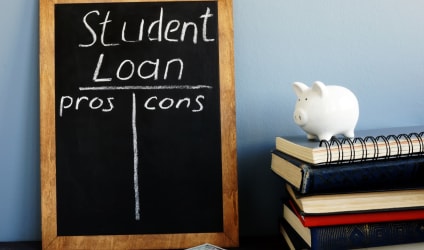What Happens If You Don’t Pay Your Student Loans?
Writer
Editor & Writer
Reviewer & Writer
Writer
Editor & Writer
Reviewer & Writer
- While rules vary, missing loan payments by a day or two may not have serious consequences.
- Those with federal loans have access to repayment plans that can mitigate risk of default.
- Defaulting on loans can lead to legal issues, wage garnishments, and more hardships.
- Consequences for nonpayment vary among lenders and whether they're federal or private.
According to the National Center for Education Statistics, 43% of first-time, full-time undergraduates took out student loans during the 2018-19 academic year. The average annual loan among these borrowers was about $7,300.
Understanding the financial responsibilities and consequences that come with loans is vital for student borrowers. This could be especially significant as student loan repayments are scheduled to resume after a lengthy pause due to COVID-19.
We look at some of the issues students may face if they miss student loan payments and what to do if the financial burden of student loan repayments proves unmanageable.
What Happens When You Miss Student Loan Payments?
When you miss student loan payments, the repercussions can vary depending on the type of loan and the timeline of nonpayments. Below, we go over what happens when you miss a loan payment.
- One Day: Typically, if you miss a student loan payment by only a few days, lenders won't pile on the repercussions. And while federal loan lenders usually let a one-day lapse slide, various private lenders may manage loans more strictly. While not a given, a missed payment can render a delinquent status, and late fees may apply.
- 30 Days: For borrowers missing a payment by 30 days, expect to be hit with a late fee — the percentage is usually around 6%. Additionally, at this point, private lenders may report delinquencies to the three major U.S. credit bureaus.
- 60 Days: At 60 days, borrowers should anticipate that private lenders will report loans as delinquent — remember, private lenders can report delinquent loans even earlier. Sometime after 60 days, federal loan servicers provide borrowers with a written notice of an impending report of delinquency 15 days before its submission.
- 90 Days: For borrowers of federal student loans, missing payments for 90 days is when tangible consequences begin. After 90 days, loan servicers inform the three major credit bureaus of the delinquency. While timelines can vary between lenders, private loans usually default after three missed monthly payments.
- 120 Days: By 120 days of delinquency, the majority of private loans enter into default, resulting in consequences like a hard-hit credit score, wage garnishments, and other legal issues. Additionally, at this point, lenders may sell your debt, potentially resulting in endless hounding from collection agencies.
- 270 Days: At 270 days of delinquency for federal loans, borrowers default on their loans for nonpayment. At this time, the borrower's entire remaining balance is due. As a result, collection agencies may manage the debt, and borrowers can be liable for significant additional fees.
What Happens When You Default on Student Loans?
It's best to avoid defaulting on student loans at all costs. At 270 days of delinquency, federal loans typically go into default, and this comes with a series of relatively serious consequences.
Once a federal loan goes into default, the borrower no longer has access to loan deferments, forbearances, and the flexibility to choose repayment plans.
Borrowers in default also lose access to future federal student aid. Defaulting on student loans also has a significant impact on a borrower's credit score, in both the short and long term. Defaults for both federal and private loans remain on your credit report for seven years after the date of default.
Once in default, a borrower's credit score can drop hundreds of points, hindering their ability to get home loans, car loans, credit cards, and even rental housing. Other consequences include wage garnishment, legal fees, and withheld federal benefits and tax refunds.
What to Do If You Can't Pay Your Student Loans: 4 Options
If your financial situation prevents you from making monthly student loan payments, it's essential to contact loan providers immediately to avoid defaulting on loans.
In addition to the impact on credit scores and various financial repercussions, defaulting on federal loans can prevent your access to future loans and loan deferments or forbearances.
For some students drowning in debt, declaring bankruptcy is available as an undesirable, final option. Even then, there's no guarantee your student loans will be discharged in court.
Here are some options that may better assist borrowers in repaying their student loans.
1. Consider Student Loan Forbearance
If making your standard loan payment is seemingly impossible, student loan forbearance allows you to temporarily suspend monthly payments. Often a last-resort choice, student loan forbearance typically lasts 12 months.
Loan forbearance can end up costing students more in the long run since they continue to accrue interest, with that total added to the principal amount.
2. Look Into Student Loan Deferment
For students who meet requirements, student loan deferments may be a better option than forbearances. Deferments allow you to pause monthly loan payments for up to three years.
Students encountering financial hardship with a federal loan may find a deferment as a reasonable option. Students with private or unsubsidized loans may accrue interest while deferring monthly payments.
3. Consolidate Your Student Loans
Student loan consolidation allows students to combine multiple federal loans. Offered through the U.S. Department of Education, this process pools loans together and results in a single loan. This is often a requirement for various federal loan repayment programs.
Similarly, student loan refinancing refers to a similar process with private loans. However, this option tends to be more suitable for those with good credit and steady income.
4. Enroll in an Income-Driven Repayment Plan
Income-driven repayment plans give loan recipients the option to make payments in proportion to their income. Designed as an affordable payment option, four income-based plans exist depending on a student's particular financial situation and goals.
Most plans have borrowers pay 10% of their discretionary income over 20-25 years. Unemployed borrowers may not have to pay until their financial situation changes.
Frequently Asked Questions About Student Loans
What happens when you default on private student loans?
Default on private student loans typically happens after 120 days, but this timeline can vary among lenders. A standard consequence of loan default includes a substantial decrease in your credit score. If you have a co-signer on the loan, it can affect their credit score as well.
Additionally, the lender can send the debt to a collection agency, leading to significant fees and relentless communication asking for repayment. Borrowers in default may also face legal issues.
How do you get student loans out of default?
Students have several ways to get loans out of default. The most common options include loan rehabilitation and loan consolidation.
Loan rehabilitation is a relatively lengthy process, but it can result in the borrower regaining access to other loans, payment plans, and loan forgiveness.
A loan consolidation program gives borrowers the chance to pay off multiple loans through a new income-driven repayment plan. While not a popular or common option, borrowers in default can also pay off their balance in its entirety.
Do student loan payments improve your credit score?
For many, a student loan is a useful way to establish and build credit. Since younger learners have a relatively short credit history, student loans add information to a credit report. And regular on-time payments can boost credit scores.
That said, students failing to make on-time payments inevitably hurt their credit score. Various factors can affect credit scores, including payment history, length of credit history, loan balance, and lender-requested credit reports.
Feature Image: Peter Dazeley / The Image Bank / Getty Images







